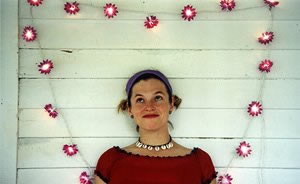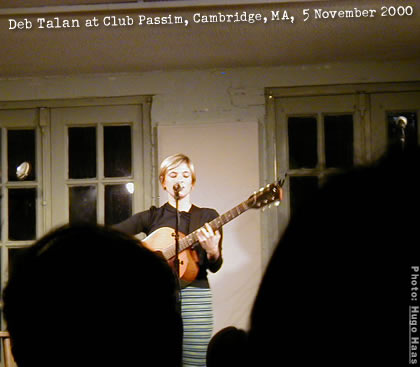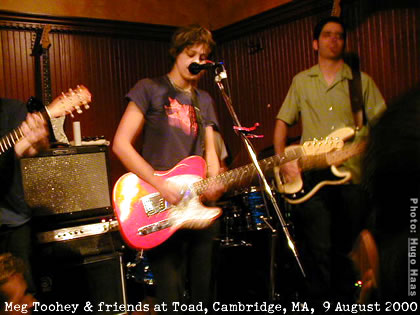
A Conversation with Steve Tannen
ST: Hi, Frank, my name is Steve Tannen. I'm in a group called The Weepies.
PM: You mean you're in my new favorite group called The Weepies.
ST: Ah, thanks, man.
PM: I haven't really loved a record like this in a long time.
ST: Wow.
PM: You know? And you know how many cross the desk of a person like myself.
ST: I can only imagine. As a musician we'll get a half a dozen a week, just from hanging out with musicians.
PM: Exactly.
ST: And you guys--I don't even know.
PM: Yeah, it's crazy what you get. So I'm very happy to meet you. Are you guys northern or southern Californians?
ST: Oh, God. We would like to resist that label as long as possible because of some of the negative connotations. We are technically living in southern California. We're about 45 minutes North of Los Angeles.
PM: So where does that put you?
ST: It's a place called Topanga. It's absolutely beautiful. Here, I'm taking you outside onto the porch, and I will hold the phone up, and you will tell me if you can hear a car, because--
PM: I hear nothing.
ST: Yeah. There is basically nothing out here.
PM: Oh, that's a beautiful thing.
ST: It's the Santa Monica Mountains, you can hear a plane in the distance. But we're on the state park. So it's thousands of acres of pristine mountains.
PM: Did you guys grow up in that area?
ST: Oh, no. Deb is from the Boston area, and I'm from New York.
PM: City?
ST: Well, my parents are from Brooklyn, and I grew up in Australia and Canada.
PM: Wild.
ST: My dad just moved around a lot and sort of took us all with him. And then Deb and I were living in western Massachusetts in 2003--we had finally moved in together and we just were looking for a change. And a buddy of ours had a cottage, like a little grandma house in the back of their place, really small, but essentially rented it to us for like $500 a month.
PM: Amazing in that ZIP code.
ST: Oh, yeah. So that's how we ended up in California.
PM: My affection for The Weepies was so immediate it was illuminating, that someone could make a sound so infectious as to make you literally love them in a period of seconds.
ST: You're making me blush, man.
PM: But it was confounding to me. So how did the partnership begin?

ST: I was a fan of Deb Talan. I was in New York. I was actually playing around--I think you just interviewed a guy named Richard Julian.
PM: Right. He's a buddy of mine.
ST: Okay, well, Richard was one of the really good guys playing around when I got to the city. In fact, he was the first guy I saw play when I got there and I thought, "Okay, cool. Cool." This was like '98, '99, and I had just gotten to New York, and Richard Julian, I used to go see him at the Living Room all the time.
But anyway, around 2000 I started hearing about this girl from Boston named Deb Talan. I got a hold of her record through a buddy named Teddy Goldstein and I just thought it was awesome. I started driving around in my car listening to it and harmonizing with it.

And I went up to play a show in Boston. I had just come out with my first solo debut record. And I was playing a show, and Deb Talan came to the show.
PM: Wow!
ST: I was like totally nervous. And she had gotten my new record and was really psyched on it. So we started writing together, started singing together--and I think there's a lot of--I don't want to speak for Deb, but for me, I just love singing with her. And I hope that comes through, because it was a dream, and then I sort of made it real.
PM: Wow.
ST: That's it, man, that's the story.
PM: Wow, that's so amazing.
ST: It was awesome. I mean, you're being very nice, but my reaction to meeting Deb was like that, it was like, "Wow, who are you," type thing. And when she said she liked my music, too, I was like, "Well, that's really nice of her." And then we played the songs with a guitar, across from each other, like until 4:00 in the morning.
PM: Wow, that's so story-booky.
ST: It's story-booky, dude. And it's the truth. And it took us about two years from there to sort of tiptoe into the joint thing, because Deb Talan was really hot in the folk scene in Boston.
PM: Right.
ST: And I didn't want to step on that, and she didn't want to lose that. At the same time I sort of had this thing going in New York City where I started getting a little bit of attention and being able to do it. And Deb lived in Boston and I lived in New York. So it was easier to tiptoe in.
PM: Is The Weepies more like Deb Talan's music or more like Steve Tannen's music?
ST: Well, what happened was, we made two records together, one was mine and one was hers. Hers was called The Bird Flies Out. Mine was called Stopped at a Green Light. And this is all in 2003. And then we had all these songs that didn't fit on either record, and it was like this other thing, and it was mostly stuff that we'd co-written. She had written a couple, I had one I wrote with my brother, but we had sort of worked them up. And just because we had a little tiny home Protools, the LE version, we were able to just keep going and do it. And we sort of thought, well, whose is it? And so we thought we'd put it out as a different musical entity. And sort of--I don't know, like we didn't want to alienate the people who loved Deb, and were like, "Who's this guy?" And we didn't want to alienate the guys who liked me playing in a dive bar with a rock band.
PM: Oh, because there was a rock band you were doing?
ST: It was singer-songwritery, but we would play at midnight at the Bitter End, or similar joints. And it was great, it was fun, but it wasn't quite what Deb and I were doing. We'd do some touring together where I would just back her up. She was doing sort of the coffeehouse circuit.
PM: Was she self-released, or did she have a label?
ST: Totally self-released. So when we started doing that, it was completely acoustic and all harmony. And then we added the bass player from my band and the electric guitar player from her Boston band.
PM: Who was that?
ST: Meg Toohey.
PM: Oh, yeah, yeah! I want to talk about her.

ST: Meg Toohey is the bomb. But that sort of was the first time--I mean, there were other characters involved as well. It's a much longer story. But in effect, what we did was we went back to the same club where we met, it's called Club Passim. And we played two shows. And rather than people being sort of not very psyched on the fact that it wasn't really Deb Talan and it wasn't really Steve Tannen, it was completely sold out and wildly enthusiastic. We were sort of stunned. That was before we released the first quote, unquote, Weepies record.
PM: I hadn't had this on my list of questions, but it almost makes me think of Glen Hansard from The Frames in Once.
ST: Yeah, yeah.
PM: And how incredibly and unpredictably that duo has taken off, too.
ST: That just warms my heart, man, that story. Great stuff.
So for us it was really easy, because it's much easier to work with Deb than it is to work alone, and I think she feels the same. And since there seemed to be a swelling of support, we were like, "Well, let's make another one." And we did.
PM: So what did you call that record that was kind of a mixed project?
ST: That was called Happiness. And we named ourselves The Weepies completely on a whim. It was clearly sort of nakedly emotional. And we thought that's what we want to do with music is get at that place where you weep from joy or from sorrow.
PM: Yeah.
ST: And we thought it's sort of jokey, but sort of serious: The Weepies. You know what I mean? Like that's funny. And it made me laugh, and Deb thought it was funny. So we did it, and we just sort of appeared as The Weepies. And then it was like it's out of your hands, then it is The Weepies. continue
print
(pdf) listen to clips
puremusic home

